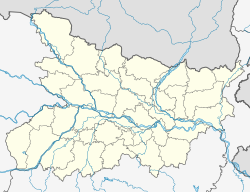This article has multiple issues. Please help improve it or discuss these issues on the talk page. (Learn how and when to remove these messages)
|
Sherghati is a town in the Gaya district in Bihar (formally Magadha), India. The Morhar River surrounds it. A meteorite that came from Mars fell here on 25 August 1865; it is now kept in a London museum and is known as the Shergotty meteorite.[2][3]
Sherghati | |
|---|---|
Town | |
| Sherghati | |
| Coordinates: 24°33′42″N 84°47′43″E / 24.56167°N 84.79528°E | |
| Country | |
| State | Bihar |
| District | Gaya |
| Named for | Valley of Lions |
| Elevation | 121 m (397 ft) |
| Population (2011)[1] | |
• Total | 40,666 |
| Time zone | UTC+5:30 (IST) |
Sherghati was under Chero rule but during 1700 it came under the rule of Rohilla chief Azam Khan. In 1857, Raja Jehangir Bux Khan revolted against the British.
Geography
editSherghati has an average elevation of 121 metres (396 feet).
Demographics
editAs of 2011[update],[4] Sherghati had a population of 40,666. Males constitute 52% of the population and females 42%. Sherghati has an average literacy rate of 74.3%, more than the national average of 74.04%. In Sherghati, 16% of the population is under 6 years of age.
References
edit- ^ "Census of India Search details". censusindia.gov.in. Retrieved 10 May 2015.
- ^ Laul, J.C (June 1986). "The Shergotty Consortium and SNC meteorites: An overview". Geochimica et Cosmochimica Acta. 50 (6): 875–887. doi:10.1016/0016-7037(86)90370-4.
- ^ "My Shop". SA Museum. Retrieved 21 July 2024.
- ^ "Census of India 2001: Data from the 2001 Census, including cities, villages and towns (Provisional)". Census Commission of India. Archived from the original on 16 June 2004. Retrieved 1 November 2008.
